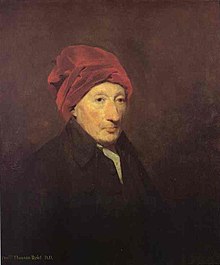
Agent causation, or Agent causality, is a category of determination in metaphysics, where a being who is not an event—namely an agent—can cause events (particularly the agent's own actions). Agent causation contrasts with event causation, which occurs when an event causes another event.[1][2] Whether agent causation as a concept is logically sound is itself a topic of philosophical debate.[1]
Defenders of this theory include Thomas Reid and Roderick Chisholm. Reid believed that agents are the only beings who have a will, and considered having a will to be a necessary condition of being considered the cause of an event.[3]
- ^ a b "Agent Causation - Bibliography". PhilPapers. Retrieved 2016-11-23.
- ^ "Agent-Causality". informationphilosopher.com. Retrieved 2016-11-23.
- ^ Rowe, William L. (1991). "Responsibility, Agent-Causation, and Freedom: An Eighteenth-Century View". Ethics. 101 (2): 237–257. doi:10.1086/293287. ISSN 0014-1704. JSTOR 2381862. S2CID 145660090.